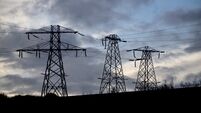Households paid the lowest amount for electricity in seven years in 2022

The 2022 figure is considerably higher than the average bill across the State in 2015, which was €746 and the average State bill in 2021, which was €740. File photo
Residential households last year paid the lowest amount for their electricity in more than seven years.
That is according to the Central Statistics Office's Trends in Metered Electricity and Gas Bills 2022. It says that after taking emergency benefit payments into account, the average bill was €909, compared to €1,268 in 2021, which was 14.1% higher than the year before.













